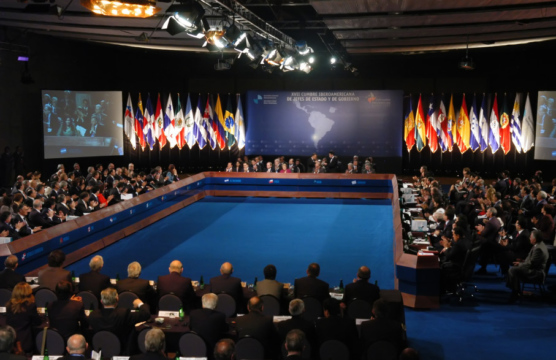With possible independence on the line, it is not surprising that Catalonia's regional election has garnered so much attention this week. But several days earlier, another critical Spanish storyline was thrown into sharp relief down south, in the Atlantic port of Cádiz during the latest Ibero-American summit.
As it turned out, Cádiz was a fitting site for the annual gathering of the heads of government and state of the Spanish- and Portuguese-speaking nations of Europe and the Americas. No city better epitomizes the nearly inverted relationship that has developed between Spain and Latin America in recent years. Cádiz was once one of Spain's most prosperous towns, and happily swallowed up treasures from the mines and plantations in its former colonies more than 200 years ago. Today, however, it has the highest level of joblessness in the country (over 36 percent) and has witnessed numerous protests as social unrest spreads across Spain. The "colonies," meanwhile, are now part of one of the world's fastest-growing and most confident regions.
Back in 1991, when the first Ibero-American summit was held in Guadalajara, Mexico, Latin America was recovering from a string of economic crises during its "lost decade" -- while Spain and Portugal were finally coming into their own. Long the only authoritarian governments remaining in Western Europe, their democracies were taking root after a shaky start and their economies were gaining ground following entry into the European Union. The first summit was in anticipation of the 500th anniversary of Christopher Columbus's voyage to the New World, and was viewed in particular by Spain as a way to re-establish its presence in Latin America. In the 1990s, Spain fulfilled that aspiration during a period that was widely known as the "re-conquest" and characterized by heightened cultural interest and frenzied investment and acquisitions by Spanish firms in the Americas.
But on Nov. 16 and 17, when the group met for the 22nd time, the tables had turned dramatically. Despite some ominous signs in a few countries, Latin American presidents were largely upbeat about their region's steady economic performance (according to the Organization of Economic Cooperation and Development, the Latin American economy will grow by 3.2 percent this year and by a projected 4 percent in 2013). Their European counterparts, however, continued to be shaken by the sovereign debt crisis in the eurozone, which is facing its own "lost decade."
The summit's Spanish hosts, Prime Minister Mariano Rajoy and King Juan Carlos I, were notably gloomy and appealed to their Latin American counterparts for support in their moment of distress. For decades, European and Spanish companies helped drive foreign investment in Latin America and helped raised Latin American concerns at the European level. Now, Spain and Portugal fully recognized Latin America's enhanced global status. (In fact, there were some calls in Cádiz for Latin American help in giving Europe greater access to Asian markets.) "Spain receives Latin American investment with open arms," Rajoy said in his opening address. Just a few years back -- let alone two decades ago -- such an entreaty would not have been taken seriously.
